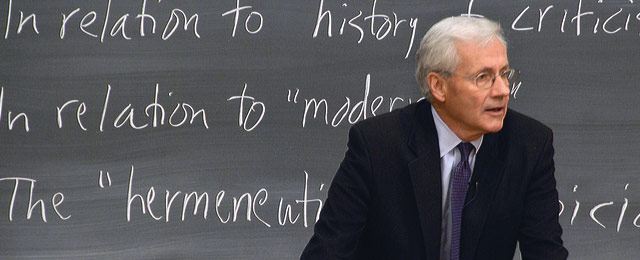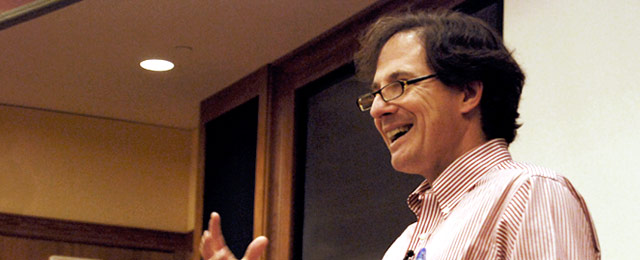Online courses directory (217)
Roman Literature of the Golden Age of Augustus Caesar, produced during the transition from Republican to Imperial forms of government, was to have a profound and defining influence on Western European and American societies. These writings ultimately established lasting models of aesthetic refinement, philosophical aspiration, and political ambition that continue to shape modern cultures. This class will be exploring the Golden Age of Latin Literature from an historical perspective in order to provide an intensive examination of the cultural contexts in which these monumental works of classical art were first produced. Readings will emphasize the transition from a Republican form of government to an Empire under the rule of Augustus Caesar and the diversity of responses among individual authors to the profound structural changes that Roman society was undergoing at this time. Particular attention will be devoted to the reorganization of society and the self through textuality, the changing dimensions of the public and the private, the roles of class and gender, and the relationship between art and pleasure. Writings covering a wide variety of literary genres will include the works of Caesar, Cicero, Catullus, Livy, Virgil, Horace, and Ovid, with additional readings from Cassius Dio for background.
This course looks at comedy in drama, novels, and films from Classical Greece to the twentieth century. Focusing on examples from Aristophanes, Shakespeare, Cervantes, Molière, Wilde, Chaplin, and Billy Wilder, along with theoretical contexts, the class examines comedy as a transgressive mode with revolutionary social and political implications. This is a Communications Intensive (CI) class with emphasis on discussion, and frequent, short essays.
Central to our era is the gradual movement of all the world's regions toward a uniform standard of economic and political development. In this class we will read a variety of recent narratives that partake of, dissent from, or contribute to this story, ranging from novels and poems to World Bank and IMF statements and National Geographic reports. We will seek to understand the many motives and voices – sometimes congruent, sometimes clashing – that are currently engaged in producing accounts of people in the developing world: their hardships, laughter, and courage, and how they help themselves and are helped by outsiders who may or may not have philanthropic motives. Readings will include literature by J. G. Ballard, Jamaica Kincaid, Rohinton Mistry, and John le Carré, as well as policy documents, newspaper and magazine articles, and the Web sites of a variety of trade and development commissions and organizations.
You will gain a foundation for college-level writing valuable for nearly any field. Students will learn how to read carefully, write effective arguments, understand the writing process, engage with others' ideas, cite accurately, and craft powerful prose. We will create a workshop environment.
First-Year Composition 2.0 will help you to develop a better process and gain confidence in written, visual, and oral communication and to create and critique college-level documents and presentations.
Learn to become an effective builder of sentences using the basic tools of English grammar, punctuation, and writing in this FREE and open course. This is a fundamental English writing course.
An introduction to academic writing for English Language Learners, focusing on essay development, grammatical correctness, and self-editing.
Humans are social animals; social demands, both cooperative and competitive, structure our development, our brain and our mind. This course covers social development, social behaviour, social cognition and social neuroscience, in both human and non-human social animals. Topics include altruism, empathy, communication, theory of mind, aggression, power, groups, mating, and morality. Methods include evolutionary biology, neuroscience, cognitive science, social psychology and anthropology.
When John Locke declared (in the 1690 Essay Concerning Human Understanding) that knowledge was derived solely from experience, he raised the possibility that human understanding and identity were not the products of God's will or of immutable laws of nature so much as of one's personal history and background. If on the one hand Locke's theory led some to pronounce that individuals could determine the course of their own lives, however, the idea that we are the products of our experience just as readily supported the conviction that we are nothing more than machines acting out lives whose destinies we do not control. This course will track the formulation of that problem, and a variety of responses to it, in the literature of the "long eighteenth century." Readings will range widely across genre, from lyric poetry and the novel to diary entries, philosophical prose, and political essays, including texts by Alexander Pope, Jonathan Swift, Mary Astell, David Hume, Laurence Sterne, Olaudah Equiano, Mary Hays, and Mary Shelley. Topics to be discussed include the construction of gender identities; the individual in society; imagination and the poet's work. There will be two essays, one 5-6 pages and one 8-10 pages in length, and required presentations.
This subject offers a broad survey of texts (both literary and philosophical) drawn from the Western tradition and selected to trace the growth of ideas about nature and the natural environment of mankind. The term nature in this context has to do with the varying ways in which the physical world has been conceived as the habitation of mankind, a source of imperatives for the collective organization and conduct of human life. In this sense, nature is less the object of complex scientific investigation than the object of individual experience and direct observation. Using the term "nature" in this sense, we can say that modern reference to "the environment" owes much to three ideas about the relation of mankind to nature. In the first of these, which harks back to ancient medical theories and notions about weather, geographical nature was seen as a neutral agency affecting or transforming agent of mankind's character and institutions. In the second, which derives from religious and classical sources in the Western tradition, the earth was designed as a fit environment for mankind or, at the least, as adequately suited for its abode, and civic or political life was taken to be consonant with the natural world. In the third, which also makes its appearance in the ancient world but becomes important only much later, nature and mankind are regarded as antagonists, and one must conquer the other or be subjugated by it.
This course examines some leading examples of major genres of storytelling in the Western tradition, among them epic (Homer's Odyssey), romance (from the Arthurian tradition), and novel (Cervantes's Don Quixote). We will be asking why people tell (and have always told) stories, how they tell them, why they might tell them the way they do, and what difference it makes how they tell them. We'll combine an investigation of the changing formal properties of narratives with consideration of the historical, cultural, and technological factors that have influenced how tales got told. In keeping with its CI-H and HASS-D label, this course will involve substantial attention to students' writing and speaking abilities.
Rhetorical Composing engages you in a series of interactive reading, research, and composing activities along with assignments designed to help you become more effective consumers and producers of alphabetic, visual and multimodal texts. Join us to become more effective writers... and better citizens.
Inspired by Eleanor Roosevelt’s famous quote, “Do one thing every day that scares you,” Stunt Writing For Personal Experience is a process that uses writing as a tool for you to learn about yourself, and gain skills in communicating your own unique story.
Writing History is a survey of historical thought, philosophy, and historiography. This course will survey the questions, methods, and debates historians have engaged in over the years and around the world. The course will also address best practices to researching and writing history.
This course comprises a broad survey of texts, literary and philosophical, which trace the development of the modern world from the seventeenth to the early twentieth century. Intrinsic to this development is the growth of individualism in a world no longer understood to be at the center of the universe. The texts chosen for study exemplify the emergence of a new humanism, at once troubled and dynamic in comparison to the old. The leading theme of this course is thus the question of the difference between the ancient and the modern world. Students who have taken Foundations of Western Culture I will obviously have an advantage in dealing with this question. Classroom discussion approaches this question mainly through consideration of action and characters, voice and form.
This subject offers a broad survey of texts (both literary and philosophical) drawn from the Western tradition and selected to trace the growth of ideas about the nature of mankind's ethical and political life in the West since the renaissance. It will deal with the change in perspective imposed by scientific ideas, the general loss of a supernatural or religious perspective upon human events, and the effects for good or ill of the increasing authority of an intelligence uninformed by religion as a guide to life. The readings are roughly complementary to the readings in 21L001, and classroom discussion will stress appreciation and analysis of texts that came to represent the cultural heritage of the modern world.
As we read broadly from throughout the vast chronological period that is "Homer to Dante," we will pepper our readings of individual ancient and medieval texts with broader questions like: what images, themes, and philosophical questions recur through the period; are there distinctly "classical" or "medieval" ways of depicting or addressing them; and what do terms like "Antiquity" or "the Middle Ages" even mean? (What are the Middle Ages in the "middle" of, for example?) Our texts will include adventure tales of travel and self-discovery (Homer's Odyssey and Dante's Inferno); courtroom dramas of vengeance and reconciliation (Aeschylus's Oresteia and the Icelandic Njáls saga); short poems of love and transformation (Ovid's Metamorphoses and the Lais of Marie de France); and epics of war, nation-construction, and empire (Homer's Iliad, Virgil's Aeneid, and the Anglo-Saxon Beowulf).
This course aims to introduce students to the rich diversity of human culture from antiquity to the early 17th century. In this course, we will explore human culture in its myriad expressions, focusing on the study of literary, religious and philosophical texts as ways of narrating, symbolizing, and commenting on all aspects of human social and material life. We will work comparatively, reading texts from various cultures: Mesopotamian, Greek, Judeo-Christian, Chinese, Indian, and Muslim. Throughout the semester, we will be asking questions like: How have different cultures imagined themselves? What are the rules that they draw up for human behavior? How do they represent the role of the individual in society? How do they imagine 'universal' concepts like love, family, duty? How have their writers and artists dealt with encounters with other cultures and other civilizations?
This is a survey of the main trends in twentieth-century literary theory. Lectures will provide background for the readings and explicate them where appropriate, while attempting to develop a coherent overall context that incorporates philosophical and social perspectives on the recurrent questions: what is literature, how is it produced, how can it be understood, and what is its purpose?
This course covers the body of modern poetry, its characteristic techniques, concerns, and major practitioners. The authors discussed range from Yeats, Eliot, and Pound, to Stevens, Moore, Bishop, and Frost with additional lectures on the poetry of World War One, Imagism, and the Harlem Renaissance. Diverse methods of literary criticism are employed, such as historical, biographical, and gender criticism.
Trusted paper writing service WriteMyPaper.Today will write the papers of any difficulty.




















